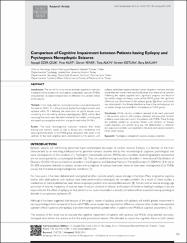| dc.contributor.author | Özer Çelik, Ayşegül | en_US |
| dc.contributor.author | Kurt, Pınar | en_US |
| dc.contributor.author | Yener, Görsev | en_US |
| dc.contributor.author | Alkın, Tunç | en_US |
| dc.contributor.author | Öztura, İbrahim | en_US |
| dc.contributor.author | Baklan, Barış | en_US |
| dc.date.accessioned | 2019-10-29T17:32:32Z | |
| dc.date.available | 2019-10-29T17:32:32Z | |
| dc.date.issued | 2015 | |
| dc.identifier.issn | 1300-0667 | |
| dc.identifier.uri | https://dx.doi.org/10.5152/npa.2015.7290 | |
| dc.identifier.uri | https://hdl.handle.net/20.500.12294/1771 | |
| dc.description | WOS: 000356420100011 | en_US |
| dc.description | PubMed ID: 28360698 | en_US |
| dc.description.abstract | Introduction: The aim of this study was to evaluate cognitive impairment in patients having epilepsy or psychogenic nonepileptic seizures (PNESs) using selected neuropsychological tests at different time periods related to the seizure. Methods: In this study, selected neurocognitive tests were administered to the patients. Within 24 h, the previously applied neurocognitive tests were repeated within 24 h following the observation of typical seizures when monitoring and normalizing electroencephalography (EEG) activity. Basal neurocognitive tests were also administered to the healthy control group, and repeat neurocognitive evaluation was performed within 24-96 h. Results: The basal neurocognitive evaluation revealed that verbal learning and memory scores as well as Stroop test interference time were significantly lower in the PNES group compared with those in the controls. In the basal cognitive tests administered to the patients with epilepsy, verbal learning and memory scores, long-term memory, and total recognition test scores were significantly lower than those of the controls. Following the repeat cognitive tests, significant progress was found in the verbal categorical fluency score of the PNES group. No significant difference was determined in the epilepsy group. Significant contraction was determined in the Stroop interference time in the control group, but no similar change was recorded in the epilepsy or PNES groups. Conclusion: While memory problems seemed to be most prominent in the assessed patients with epilepsy, attention and executive function problems were more dominant in the patients with PNESs. These findings are probably related to numerous factors such duration of disease, mood disorders, and specific drug use. No deterioration in attention and executive functions was reported in the early post-seizure period in either patient group. | en_US |
| dc.language.iso | eng | en_US |
| dc.publisher | AVES | en_US |
| dc.relation.ispartof | NOROPSIKIYATRI ARSIVI-ARCHIVES OF NEUROPSYCHIATRY | en_US |
| dc.identifier.doi | 10.5152/npa.2015.7290 | en_US |
| dc.identifier.doi | 10.5152/npa.2015.7290 | |
| dc.rights | info:eu-repo/semantics/openAccess | en_US |
| dc.subject | Psychogenic Nonepileptic Seizure | en_US |
| dc.subject | Epilepsy | en_US |
| dc.subject | Cognition | en_US |
| dc.title | Comparison of Cognitive Impairment between Patients having Epilepsy and Psychogenic Nonepileptic Seizures | en_US |
| dc.type | article | en_US |
| dc.department | İstanbul Arel Üniversitesi, Fen-Edebiyat Fakültesi, Psikoloji Bölümü | en_US |
| dc.identifier.volume | 52 | en_US |
| dc.identifier.issue | 2 | en_US |
| dc.identifier.startpage | 163 | en_US |
| dc.identifier.endpage | 168 | en_US |
| dc.relation.publicationcategory | Makale - Uluslararası Hakemli Dergi - Kurum Öğretim Elemanı | en_US |
| dc.department-temp | [Ozer Celik, Aysegul] Kanuni Training & Res Hosp, Neurol Clin, Trabzon, Turkey -- [Kurt, Pinar] Istanbul Arel Univ, Dept Psychol, Istanbul, Turkey -- [Yener, Gorsev -- Oztura, Ibrahim -- Baklan, Baris] Dokuz Eylul Univ, Fac Med, Dept Neurol, Izmir, Turkey -- [Alkin, Tunc] Dokuz Eylul Univ, Fac Med, Dept Psychiat, Izmir, Turkey | en_US |


















